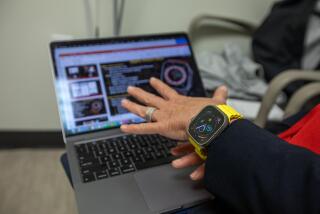Cardiac Science to Buy Maker of Defibrillators
- Share via
Cardiac Science Inc. of Irvine, moving to capitalize on the burgeoning demand for defibrillator machines that are cropping up at malls, airports and other public sites, is acquiring a leading manufacturer of these cardiac devices.
Cardiac Science’s acquisition of Minneapolis-based Survivalink Corp.--a company about four times its size--for $71 million is expected to be announced today. The transaction comes as health experts are urging that portable defibrillators be made available in public gathering places.
Defibrillators, which use an electrical shock to restore normal heartbeats, had been used primarily in hospitals and ambulances until recent years. But sales of the devices for public locations have surged recently, becoming the fastest-growing segment of the market.
The devices, which last year accounted for 15.5% of total defibrillator sales, are expected to account for nearly 43% of the market by 2006, according to research firm Frost & Sullivan.
“We’re entering the hottest space in med tech,” said Cardiac Chief Executive Raymond W. Cohen.
Survivalink’s sales totaled $17 million last year, about 20% of the total sales of defibrillators for public sites. The company’s customers include the Los Angeles County Fire Department, Korean Airlines and General Electric Co. Cardiac Science said Survivalink is profitable, but wouldn’t disclose earnings.
Survivalink ranks third behind Agilent Technologies Inc. and Medtronic Inc. in worldwide sales of automated external defibrillators, said Frost & Sullivan analyst Harini Raj, adding that competition is heating up.
“There are huge growth opportunities, and other companies will be entering the market,” Raj said.
The deal opens up a new market for Cardiac Science, which currently sells one product, a defibrillator for hospital patients. The acquisition also figures to provide a financial boost for a 10-year-old company that has never made money and only began to record sales late in 1999.
Cardiac Science posted operating losses of $5.6 million in the third quarter on sales of $1.2 million. Cardiac hasn’t disclosed fourth-quarter results yet.
At present, Cardiac sells the Powerheart, which continuously monitors heart rates and automatically delivers jolts during cardiac arrest. Cardiac plans to integrate its software into Survivalink’s devices so patients can stay attached to portable defibrillators immediately after cardiac arrest, Cohen said.
About 220,000 Americans die of cardiac arrest each year. Access to early defibrillation could save 50,000 lives annually, said the American Heart Assn., which recommends putting the devices in high-rise buildings, malls, golf courses, airplanes and other public places.
Medical studies show that for every minute of heart fibrillation--a condition marked by the rapid quivering of the muscle that prevents the heart from pumping blood throughout the body--the chance of survival decreases by 10%, according to the heart association.
Late last year, President Clinton signed legislation recommending that portable defibrillators be placed in all federal buildings. Locally, the city of Anaheim has installed them in many city offices, including city hall. Both Los Angeles International Airport and John Wayne Airport in Orange County hope to put dozens of laptop-size defibrillators in terminals by the end of the year.
Unlike the cumbersome, complex models in ambulances and elsewhere, portable defibrillators are relatively easy to use and require little training. In some instances, voice prompts guide users through the process of attaching electrodes to the chest of a cardiac arrest victim and, if needed, applying electrical shocks to restore a normal heart rhythm.
Cardiac paid $35.5 million in cash and $35.5 million in stock for Survivalink. The company will fund the acquisition by issuing more stock and selling shares through a private placement with existing investors, Cohen said.
Cardiac also initiated two smaller deals in recent months. In July, the company acquired Cadent Medical Corp., a Bedford, Mass., developer of cell phone-size defibrillators, for $22.5 million in stock.
To gain access to new overseas clients, Cardiac agreed in January to acquire Artema Medical, a Swedish maker of patient monitors and defibrillators, for $20 million in stock. The deal is expected to close by the end of April, said Michael Gioffredi, vice president of sales and marketing.
Cardiac’s most ambitious buyout effort, a bid to acquire Spacelabs Medical Inc. for $143 million in stock, fell through after the Redmond, Wash., manufacturer of patient-monitoring devices and clinical information systems showed no interest, CEO Cohen said.
Cardiac hopes to acquire a couple of other manufacturers of defibrillators or patient monitors by the end of the year, Cohen said.
“There’s a race to capture market share,” he said. “We want to be a player.”
Cardiac’s stock closed at $4.88 Tuesday, down 16 cents in Nasdaq trading. The shares have gained about 15% this year, but are far below the 52-week high of $10 reached in September.
More to Read
Inside the business of entertainment
The Wide Shot brings you news, analysis and insights on everything from streaming wars to production — and what it all means for the future.
You may occasionally receive promotional content from the Los Angeles Times.









